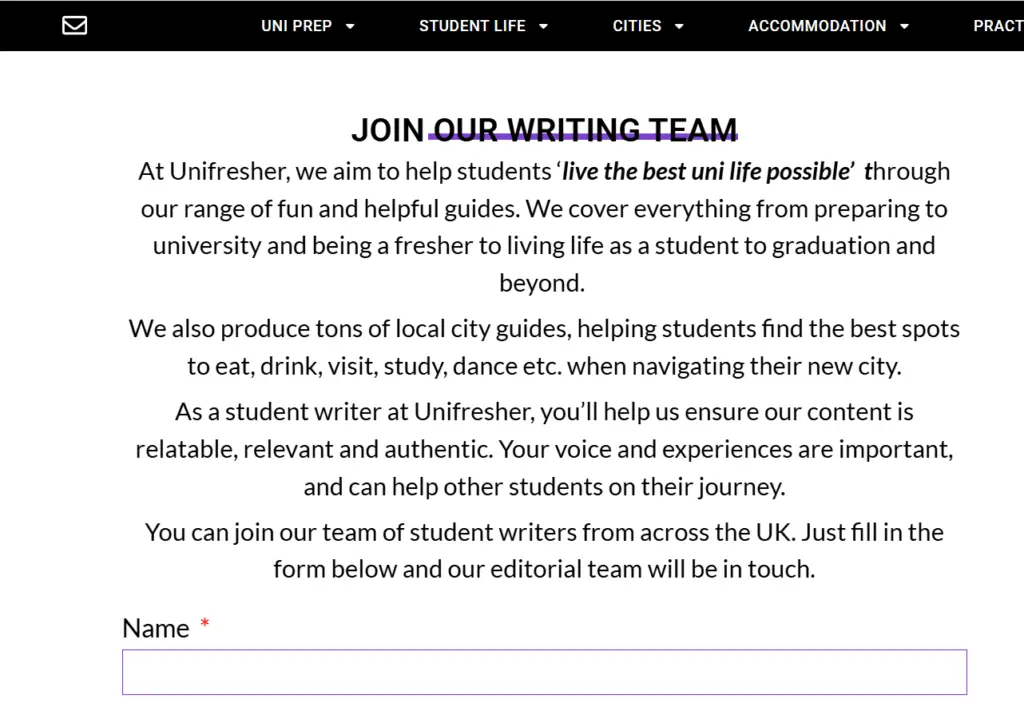In my experience, trying to get work experience in creative writing feels like a catch-22: you need experience to get published/offered a job in a creative area, but you also need those things to gain experience. However, there are plenty of easy and accessible ways to get work experience in creative writing, even while you’re at university. Here are some tips on how to build a portfolio and gain experience.
1. Write regularly
One of the best ways to gain experience is to write regularly. Experiment. Write short stories, poetry, blog posts, creative essays, even experiment on writing taglines for your favourite brands. The more different styles of writing you can practice, the better; the more confident you become. Writing regularly allows you to create your own distinctive voice. Set yourself challenges to develop your writing.
2. Start a blog/portfolio
One of the easiest ways to gain experience with creative writing is to create your own blog. A blog allows you to put your writing out there, whether it be fiction, poetry, lifestyle… It shows consistency and motivation to future editors or employers who might stumble across your platform.
Platforms best for creating a blog include:
- WordPress
- Wix
- Substack
- Blogger
Make sure you include an ‘About Me’ section and a ‘Contact Me’ section, and update your blog often with new work.
3. Write for platforms
Student-focused websites actively look for articles and creative writing pieces from students (hint, hint, Unifresher 😉).

Unifresher covers content ranging from student life, mental health support, city-specific content and other fun content that’s relevant for university students. Writing for a platform like Unifresher gives you real publication credits and work experience. You can register your interest to be a student writer easily.
4. Reach out to your uni’s societies/magazines

Universities have lots of different opportunities for creative writers. Most universities have a creative writing society which I’d recommend joining. The societies have varying writing exercises you can join in with, and they’ll have opportunities for you to get your work out there.
Some universities have a student led magazine which you’d be able to contribute to, whether it be a article, or a more fictional piece; for example, The University of Sheffield has Route 57 which is an online creative writing magazine. Contributing to a student newspaper would get your work published and noticed.
Opportunities such as these provide changes to get involved with writing, editing, events, and workshops which provide great experience. They also sit nicely on your portfolio.
5. Enter student and national competitions
Another great way of getting experience is by entering different writing competitions. These competitions often offer cash prizes, mentorships, or publication.
Some competitions to look out for are:
- Foyle Young Poets (for under 25s)
- BBC Young Writers’ Award
- The Bridport Prize
Keep an eye out on notice boards around the university too, especially around the creative writing areas of your uni. Lecturers will often put up posters advertising different competitions you can enter. Quite often, universities run their own themed competitions, for example, Bangor University often does a Halloween themed competition. Keep an eye on your university newsletter, they’ll often signpost different opportunities too.
6. Submit your writing!
Don’t wait until after you’ve graduated university to try get published! There are plenty of opportunities online where you can submit your work.
I’d recommend using a website like Submittable or Chill Subs as they’ll show you various different opportunities that are available, and it’s easier to track your submissions.
Other good websites to consider are:
- Mslexia
- LitroMagazine
- Scribbled Online
- Bitter Melon Review
- The Gilded Dragon
Try scouting Instagram for smaller literary magazines, they tend to look for submissions a lot more!
Make sure to follow all submission guidelines too.
My advice is to prepare to get more rejections than acceptances, that way you’re motivated to submit more. Sometimes, you do get lucky and get acceptances back to back; for example, this year I’ve been lucky to have had several physical and digital publications.
7. Continue building your portfolio
As you gain more and more experience, ensure you have a professional-looking portfolio showcasing:
- a brief bio
- contact details
- links to published pieces
- examples/excerpts of your work
You can create a website and/or a PDF which you can attach with submissions. Portfolios help you showcase your work and talent, even if you’ve just begun your creative writing experience.
8. Attend events
Keep your eye out for local open mic evenings or poetry reading events, attend literary festivals (such as Hay or Edinburgh), attend online writing workshops etc.
You’ll gain experience through these, and confidence.
There are plenty of opportunities to gain creative writing experience. As a university student, you’re surrounded by so many more opportunities and chances. From things like literary journals, to sites like Unifresher, the opportunities are endless. The more you write and share, the more experience you’ll gain. So start now!
See here for our Day in the Life of a Creative Writing Student.
Author
-
I'm a BA English Literature student at Chester University! I enjoy writing a mix of poetry, short fiction, and journalism– I'm a featured poet in a handful of anthologies.
View all posts





